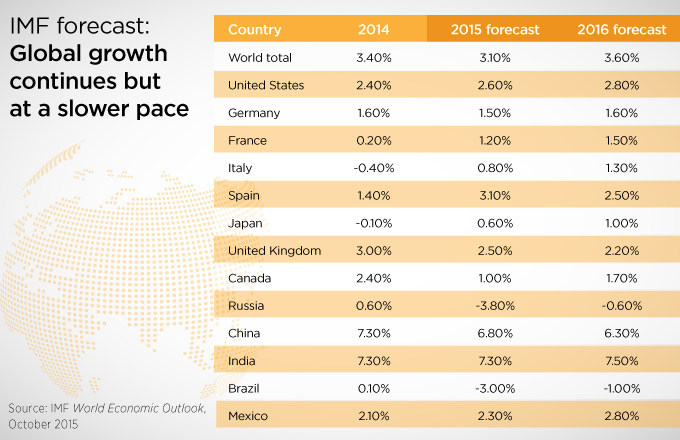Expectations for global economic growth in 2016 are a little less optimistic than earlier this year, as commodity prices have plummeted in the past three months, according to the International Monetary Fund’s (IMF) most recent report.
A lackluster outlook for commodity prices, namely energy and metals, may curb growth in commodity-exporting emerging and developing economies in coming years, stated the IMF in its latest World Economic Outlook.
Compared with the IMF’s July forecasts, the new World Economic Outlook reduces expectations for global growth in 2015 and 2016 by 0.2 percentage points, though the expected rate of growth is higher than for 2015.
Still, global growth is uneven. The United States is among the economies that may see a moderate acceleration. In contrast to its July outlook for the United States, the IMF calls for growth in 2015 to be a tenth of a percent higher, at 2.6%, and rise to 2.8% next year. However, the most recent 2016 projection is slightly lower than in the July forecast.
Pessimism about Brazil and Canada
The outlook was particularly pessimistic for Brazil and Canada, both of which are reliant on commodity exports. China, a driver of demand during the recent commodity boom, and Brazil are headed for their fifth consecutive year of declining GDP output, the report states.
The IMF slashed Brazil’s projected output by 1.5 percentage points for this year and 1.7 percentage points for 2016. Canadian GDP was trimmed by 0.5 percentage points in 2015 and 0.4 percentage points in 2016.
Low oil and commodity prices have hurt both Brazil and Canada. Brazil also has been hurt by an internal corruption scandal at state-run Petrobas and by its exposure to China. In addition, Brazil’s long-term foreign sovereign currency rating recently received junk status from Standard & Poor’s rating agency.
Globally, persistently low investment was cited as a fundamental problem that has limited advances in labor productivity as well as wage gains, the IMF stated. Geopolitical risks, such as the migrant crisis in Europe, military conflicts in Syria and Iraq, and the rise of the terrorist group ISIS, are also factors.

297955
